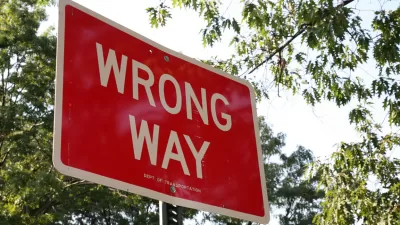Excerpts of an interview with Ohio Department of Transportation Director Jerry Wray, who spoke candidly about the state's role in maintaining and building transportation projects in Cincinnati and around the state of Ohio.
Ohio’s top transportation official, Department of Transportation Director Jerry Wray, spoke with the editorial board of the Cincinnati Enquirer recently. The publication presents excerpts from that conversation on "five hot topics": mass transit, the Brent Spence Bridge, the Eastern Corridor, reauthorization of the federal transportation bill, and "who controls the transportation purse strings."
The excerpts include a few hot buttons, to be sure, including this statement from the "mass transit" excerpt: "Speaking for myself, not the governor, we should be responding to the public need and to some degree public want. We shouldn’t be doing social engineering. We shouldn’t try to force people onto a highway, nor should we try to force people into a bus or onto a train." Interestingly, Wray returns to the social engineering trope when discussing transportation funding in calling for more state control over state transportation decisions.
Regarding the Brent Spence Bridge (which made news recently dude to concerns in the business community about EPA smog rules), Wray offers another interesting insight: "Wherever you are in the country these days if you’re going to build a project this size it’s going to involve tolls."
FULL STORY: 5 hot topics: ODOT leader on bridge, transit

Alabama: Trump Terminates Settlements for Black Communities Harmed By Raw Sewage
Trump deemed the landmark civil rights agreement “illegal DEI and environmental justice policy.”

Planetizen Federal Action Tracker
A weekly monitor of how Trump’s orders and actions are impacting planners and planning in America.

How Atlanta Built 7,000 Housing Units in 3 Years
The city’s comprehensive, neighborhood-focused housing strategy focuses on identifying properties and land that can be repurposed for housing and encouraging development in underserved neighborhoods.

In Both Crashes and Crime, Public Transportation is Far Safer than Driving
Contrary to popular assumptions, public transportation has far lower crash and crime rates than automobile travel. For safer communities, improve and encourage transit travel.

Report: Zoning Reforms Should Complement Nashville’s Ambitious Transit Plan
Without reform, restrictive zoning codes will limit the impact of the city’s planned transit expansion and could exclude some of the residents who depend on transit the most.

Judge Orders Release of Frozen IRA, IIJA Funding
The decision is a victory for environmental groups who charged that freezing funds for critical infrastructure and disaster response programs caused “real and irreparable harm” to communities.
Urban Design for Planners 1: Software Tools
This six-course series explores essential urban design concepts using open source software and equips planners with the tools they need to participate fully in the urban design process.
Planning for Universal Design
Learn the tools for implementing Universal Design in planning regulations.
Jessamine County Fiscal Court
Caltrans
Institute for Housing and Urban Development Studies (IHS)
City of Grandview
Harvard GSD Executive Education
Toledo-Lucas County Plan Commissions
Salt Lake City
NYU Wagner Graduate School of Public Service



























